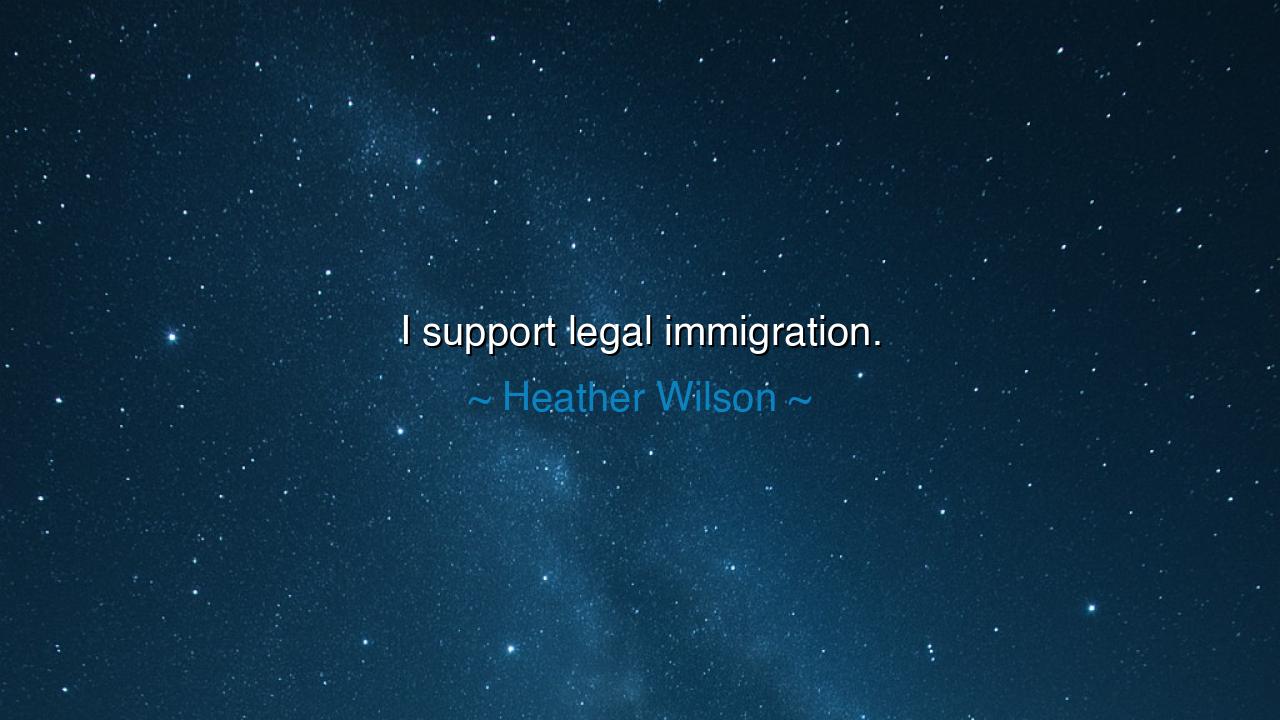
I support legal immigration.






When Heather Wilson declared, “I support legal immigration,” her words may seem simple, yet they carry the weight of centuries — a reflection on law, belonging, and the moral fabric of civilization. To support legal immigration is not to close the gates of compassion, but to recognize that every human journey must be balanced between freedom and order, aspiration and responsibility. It is a statement born from the understanding that nations, like gardens, thrive when cultivated with care — when new seeds are planted not in chaos, but with intention, so that both the soil and the seed may flourish together.
In ancient lands, the question of who may enter the city walls was not merely practical — it was sacred. The Greeks had a word, xenia, meaning the bond between guest and host, a divine law of hospitality overseen by Zeus himself. But even then, boundaries were kept; strangers were welcomed, yet the sanctity of the city was guarded. This ancient balance mirrors Wilson’s sentiment: that immigration must be lawful, not to deny the stranger, but to protect the harmony of the community that welcomes them. For a home without doors invites disorder, and a border without rule invites suffering both within and without.
Wilson’s words emerge from the soil of America’s long and complex history — a land built by immigrants who followed the light of legality, who took oaths, learned languages, and wove themselves into the nation’s destiny. Yet alongside them were those who came through shadowed paths, driven by desperation, poverty, or hope unmet. Her declaration is not a rejection of those souls, but a call to restore dignity to migration — to affirm that when one enters through the gates of law, one’s belonging is earned through respect, and one’s welcome is complete.
Consider the great waves of newcomers who once arrived on Ellis Island. They stood trembling beneath the gaze of liberty, holding only faith and their names. But they came through the process, the examination, the promise — and in so doing, they became part of something greater than themselves. The law did not diminish them; it sanctified their courage. They followed a path not of rebellion but of reverence, and their children became citizens who built cities, universities, and dreams. In their stories, the essence of legal immigration lives on: the belief that freedom is strongest when coupled with discipline.
Yet Wilson’s quote also contains a warning — that compassion without structure can become chaos, and that justice without mercy can harden into cruelty. The wise ruler and the wise people must walk between these extremes. To support legal immigration is to affirm that law is not the enemy of humanity, but its shield. It is to recognize that when the rules are fair and the doors are open to those who seek peace, the nation grows not only in number, but in spirit and purpose. Law is not a barrier to kindness — it is its foundation.
The lesson of this quote, then, reaches beyond politics. It is a reminder that every good thing — whether love, art, or nation — must have its boundaries to preserve its beauty. Even rivers, though flowing freely, are shaped by their banks. So too must humanity’s compassion flow within the guidance of justice. Without that, the flood of good intentions may drown the very ideals it seeks to uphold. Wilson’s stance calls us not to fear the foreigner, but to uphold the sanctity of entry, that each who comes may belong in truth, not just in presence.
Let each generation remember: the strength of a nation lies not in its walls, but in its wisdom to open them rightly. The laws that govern migration are not mere rules; they are the handshakes between strangers and citizens, the spoken promise that both will honor the order of peace. To support legal immigration is to say — “We welcome you, but we welcome you rightly.” It is to bind freedom with duty, compassion with structure, and to ensure that the story of human movement remains a story of light, not confusion.
Thus, let this teaching endure: Law is not the cage of liberty, but its frame. Those who walk the lawful path into a land do not merely enter its soil — they enter its heart. And those who uphold justice while showing mercy build nations that last. For as long as there are borders to cross and hearts that yearn for a new beginning, the wisdom of Heather Wilson’s words will remain: that freedom and law, together, are the pillars upon which all true nations stand.






AAdministratorAdministrator
Welcome, honored guests. Please leave a comment, we will respond soon